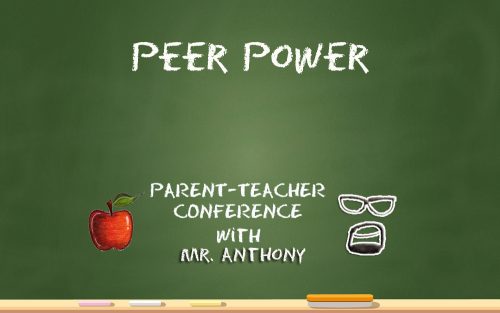Dear Parents,
Welcome to February! Last time we chatted about Staying Informed and this week is kind of related to that general idea. Today, I am encouraging you to stay informed about your kids and help them realize the power of peers. Peer pressure is something that is discussed from the early grades through college, but what does that actually mean?
Peers have power. What we sometimes seem to forget is that power can be positive and/or negative. The initial reaction to peer pressure is generally a negative one – peers influencing students to participate in negative behavior. But it can be positive and helpful. Students can push each other to achieve more, to participate in healthy behaviors, and to avoid potential temptations that litter the daily life of a student.
So what does this mean for parents? A few things, but foremost I would encourage you to know your child’s friends. Also, pay attention to how your son or daughter’s behavior changes around them. Is she happy? Is she excessively trying to impress the friend? Do her manners change positively, or negatively, during their time together – or after she has spent time with this friend?
Try to pay attention to patterns. Also, realize that some behavior is typical. Keep in mind that kids are working so hard to find themselves, and to figure out where they fit in. There will be changes and challenges. Not all of them will be bad. Maybe none of them will be bad – some might even be comical moments, or phases, that she will look back at and laugh about later. Think about your own school history – I know I have many awkward, embarrassing times.
So what can you do? If you have young students, talk about friendship. When you are young, EVERYONE is your friend: your teachers, kids you meet for 5 minutes, your classmates, maybe even that friendly face at the grocery store. Eventually, kids begin to close that group and form a smaller inner circle – and this may include kids and adults. Talk about the importance of surrounding yourself with positive people. Try not to be “judgey” as this can have a negative impact on the line of communication between you and your student.
Peers have power. Be sure to talk about this in the context of “friends” and classmates. Have a younger student? Ask about whom they play with at the playground, or sit with at lunch – OR if there are classmates that don’t get played with at the playground, or classmates that maybe aren’t the first to get included at the lunch table. Help your student to not only see the power of her peers, but that SHE has power, influence as well – and encourage her to be a positive influence. This is a good way to talk about things like bullying and inclusion. This is a good time to talk about recognizing differences, but not excluding people because of them. This is also a good time to chat about ways of declining invitations, or removing one’s self from situations that are potentially dangerous, inappropriate, or inconsiderate of others.
There are a lot of gray areas in the daily life of a student, and peers play a huge role in helping your student navigate these daily dilemmas. Help your student to recognize peer power and use it in a positive manner. And by all means, if you see any troubling patterns, or just have questions about behavior in your student that you don’t understand – reach out to your school counselor. Counselors can be a great resource for parents. Don’t be afraid to utilize them, but be sure to keep the conversation about your student. Counselors and teachers are not a means to vet out the friends of your child. However, we are familiar with typical behaviors and can give you some insight on what we see during the course of the school day.
Hopefully those ideas are useful, and, as usual, I would love to field some questions from you. Send them to me at creed@lifeofdad.com or tweet me at @acjlist. Have a great week!
Creed Anthony is a father of two, husband, teacher, and writer. In addition to the pages of Life of Dad, you may find him at his two blogs: Talesfromthepoopdeck.com and BalconyDads.com, and on Twitter @acjlist.


